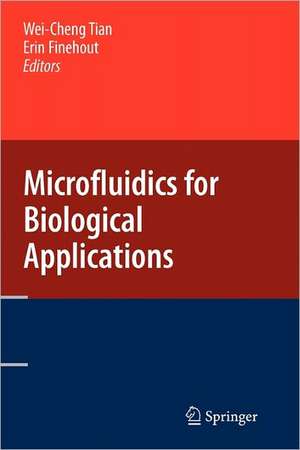Microfluidics for Biological Applications
Editat de Wei-Cheng Tian, Erin Finehouten Limba Engleză Paperback – 29 oct 2010
The material presented here is divided into four parts, Part I gives perspective on the history and development of microfluidic technologies, Part II presents overviews on how microfluidic systems have been used to study and manipulate specific classes of components, Part III focuses on specific biological applications of microfluidics: biodefense, diagnostics, high throughput screening, and tissue engineering and finally Part IV concludes with a discussion of emerging trends in the microfluidics field and the current challenges to the growth and continuing success of the field.
| Toate formatele și edițiile | Preț | Express |
|---|---|---|
| Paperback (1) | 951.14 lei 6-8 săpt. | |
| Springer Us – 29 oct 2010 | 951.14 lei 6-8 săpt. | |
| Hardback (1) | 955.25 lei 6-8 săpt. | |
| Springer Us – 27 oct 2008 | 955.25 lei 6-8 săpt. |
Preț: 951.14 lei
Preț vechi: 1159.94 lei
-18% Nou
Puncte Express: 1427
Preț estimativ în valută:
181.100€ • 198.32$ • 153.36£
181.100€ • 198.32$ • 153.36£
Carte tipărită la comandă
Livrare economică 23 aprilie-07 mai
Preluare comenzi: 021 569.72.76
Specificații
ISBN-13: 9781441934840
ISBN-10: 1441934847
Pagini: 416
Ilustrații: XX, 416 p. 95 illus.
Dimensiuni: 155 x 235 x 23 mm
Greutate: 0.61 kg
Ediția:Softcover reprint of hardcover 1st ed. 2009
Editura: Springer Us
Colecția Springer
Locul publicării:New York, NY, United States
ISBN-10: 1441934847
Pagini: 416
Ilustrații: XX, 416 p. 95 illus.
Dimensiuni: 155 x 235 x 23 mm
Greutate: 0.61 kg
Ediția:Softcover reprint of hardcover 1st ed. 2009
Editura: Springer Us
Colecția Springer
Locul publicării:New York, NY, United States
Public țintă
ResearchCuprins
to Microfluidics.- Materials and Microfabrication Processes for Microfluidic Devices.- Interfacing Microfluidic Devices with the Macro World Abstract.- Genetic Analysis in Miniaturized Electrophoresis Systems.- Microfluidic Systems for Protein Separations.- Microfluidic Systems for Cellular Applications.- Microfluidic Systems for Engineering Vascularized Tissue Constructs.- High Throughput Screening Using Microfluidics.- Microfluidic Diagnostic Systems for the Rapid Detection and Quantification of Pathogens.- Microfluidic Applications in Biodefense.- Current and Future Trends in Microfluidics within Biotechnology Research.
Recenzii
Aus den Rezensionen:“Das Buch besteht aus einer SammIung von Übersichtsartikeln zu relevanten Themen in der Mikrofluidik. ... Die einzelnen Übersichtsartikel beschreiben umfassend und detailliert den Stand der Technik. ... Alle Kapitel geben eine ausführliche Sekundärliteraturliste und verweisen auf ... mikrofluidische Chips und Geräte, um diese auszulesen. ... Insbesondere die ... Einleitungen, die Erläuterungen der ... Materialien und die Darstellung zukünftiger Trends werden in jedem Kapitel erneut diskutiert. ... Zusammenfassend lässt sich sagen, dass einem in den Lebenswissenschaften geschulten Leser das Thema eines Übersichtsartikels kurz und umfassend näher gebracht wird ...“ (Yvonne Joseph, in: Analytical and Bioanalytical Chemistry, 2010, Issue 1, S. 20)
Textul de pe ultima copertă
Microfluidics for Biological Applications provides researchers and scientists in the biotechnology, pharmaceutical, and life science industries with an introduction to the basics of microfluidics and discusses how to link these technologies to various biological applications at the industrial and academic level. Readers will gain insight into a wide variety of biological applications for microfluidics.
The book begins with a perspective on the history and development of microfluidic technologies, followed by an overview on how microfluidic systems have been used to study and manipulate specific classes of components, including a discussion of specific biological applications of microfluidics and concludes with a discussion of emerging trends in the field. Microfluidics for Biological Applications provides information about the latest techniques and trends including:
The book begins with a perspective on the history and development of microfluidic technologies, followed by an overview on how microfluidic systems have been used to study and manipulate specific classes of components, including a discussion of specific biological applications of microfluidics and concludes with a discussion of emerging trends in the field. Microfluidics for Biological Applications provides information about the latest techniques and trends including:
- Fabrication methods for microfluidic devices, including those using biodegradable materials
- Use of microfluidics for high throughput screening
- Microfluidic methods for detection of pathogens in diagnostic and biodefense applications
- Analysis and manipulation of DNA, proteins, and cells in a microfluidic device
- Use of microfluidic platforms for tissue engineering and vascularization
Caracteristici
Provides readers with a primer overview and history of microfluidics so they can get up to speed quickly Discusses and provides insights into how microfluidics can be used in various biological applications Shows how microfluidic concepts are at work in specific products Discusses the use of microfluidic systems in a wide range of biological settings including: genomic applications, protein science and proteomic applications, high throughput screening, cellular applications and more












